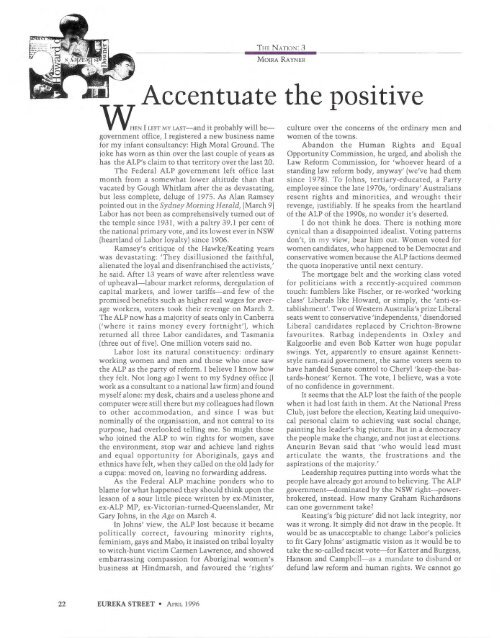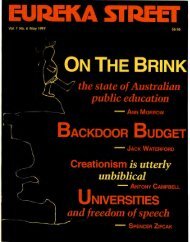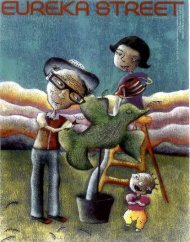Shane Malone - Eureka Street
Shane Malone - Eureka Street
Shane Malone - Eureka Street
Create successful ePaper yourself
Turn your PDF publications into a flip-book with our unique Google optimized e-Paper software.
THE NATION: 3<br />
M OIRA R AYNER<br />
Accentuate the positive<br />
W ,N I mT M' CAST-and it pwbably will begovernment<br />
office, I registered a new business name<br />
for my infant consultancy: High Moral Ground. The<br />
joke has worn as thin over the last couple of years as<br />
has the ALP's claim to that territory over the last 20.<br />
The Federal ALP government left office last<br />
month from a somewhat lower altitude than that<br />
vacated by Gough Whitlam after the as devastating,<br />
but less complete, deluge of 1975. As Alan Ramsey<br />
pointed out in the Sydney Moming Herald, [March 9j<br />
Labor has not been as comprehensively turned out of<br />
the temple since 1931, with a paltry 39.1 per cent of<br />
the national primary vote, and its lowest ever in NSW<br />
(heartland of Labor loyalty) since 1906.<br />
Ramsey's critique of the Hawke/Keating years<br />
was devastating: 'They disillusioned the faithful,<br />
alienated the loyal and disenfranchised the activists,'<br />
he said. After 13 years of wave after relentless wave<br />
of upheaval-labour market reforms, deregulation of<br />
capital markets, and lower tariffs-and few of the<br />
promised benefits such as higher real wages for average<br />
workers, voters took their revenge on March 2.<br />
The ALP now has a majority of seats only in Canberra<br />
('where it rains money every fortnight'), which<br />
returned all three Labor candidates, and Tasmania<br />
(three out of five). One million voters said no.<br />
Labor lost its natural constituency: ordinary<br />
working women and men and those who once saw<br />
the ALP as the party of reform. I believe I know how<br />
they felt. Not long ago I went to my Sydney office (I<br />
work as a consultant to a national law firm) and found<br />
myself alone: my desk, chairs and a useless phone and<br />
computer were still there but my colleagues had flown<br />
to other accommodation, and since I was but<br />
nominally of the organisation, and not central to its<br />
purpose, had overlooked telling me. So might those<br />
who joined the ALP to win rights for women, save<br />
the environment, stop war and achieve land rights<br />
and equal opportunity for Aboriginals, gays and<br />
ethnics have felt, when they called on the old lady for<br />
a cuppa: moved on, leaving no forwarding address.<br />
As the Federal ALP machine ponders who to<br />
blame for what happened they should think upon the<br />
lesson of a sour little piece written by ex-Minister,<br />
ex-ALP MP, ex-Victorian-turned-Queenslander, Mr<br />
Gary Johns, in the Age on March 4.<br />
In Johns' view, the ALP lost because it became<br />
politically correct, favouring minority rights,<br />
femini m, gay and Mabo; it insisted on tribal loyalty<br />
to witch-hunt victim Carmen Lawrence, and showed<br />
embarrassing compassion for Aboriginal women's<br />
business at Hindmarsh, and favoured the 'rights'<br />
culture over the concerns of the ordinary m en and<br />
women of the towns.<br />
Abandon the Human Rights and Equal<br />
Opportunity Commission, he urged, and abolish the<br />
Law Reform Commission, for 'whoever heard of a<br />
standing law reform body, anyway' (we've had them<br />
since 1978). To Johns, tertiary-educated, a Party<br />
employee since the late 1970s, 'ordinary' Australians<br />
resent rights and minorities, and wrought their<br />
revenge, justifiably. If he speaks from the heartland<br />
of the ALP of the 1990s, no wonder it's deserted.<br />
I do not think he does. There is nothing more<br />
cynical than a disappointed idealist. Voting patterns<br />
don't, in my view, bear him out. Women voted for<br />
women candidates, who happened to be Democrat and<br />
conservative women because the ALP factions deemed<br />
the quota inoperative until next century.<br />
The mortgage belt and the working class voted<br />
for politicians with a recently-acquired common<br />
touch: fumblers like Fischer, or re-worked 'working<br />
class' Liberals like Howard, or simply, the 'anti-establishment'-<br />
Two of Western Australia's prize Liberal<br />
scats went to conservative 'independents,' disendorsed<br />
Liberal candidates replaced by Crichton-Browne<br />
favourites. Ratbag independents in Oxley and<br />
Kalgoorlic and even Bob Katter won huge popular<br />
swings. Yet, apparently to ensure against Kennettstyle<br />
ram-raid government, the same voters seem to<br />
have handed Senate control to Cheryl 'keep-the-bastards-honest'<br />
Kernot. The vote, I believe, was a vote<br />
of no confidence in government.<br />
It seems that the ALP lost the faith of the people<br />
when it had lost faith in them. At the National Press<br />
Club, just before the election, Keating laid unequivocal<br />
personal claim to achieving vast social change,<br />
painting his leader's big picture. But in a democracy<br />
the people make the change, and not just at elections.<br />
Aneurin Bevan said that 'who would lead must<br />
articulate the wants, the frustrations and the<br />
aspirations of the majority.'<br />
Leadership requires putting into words what the<br />
people have already go t around to believing. The ALP<br />
government-dominated by the NSW right-powerbrokered,<br />
instead. How many Graham Richardsons<br />
can one government take<br />
Keating's 'big picture' did not lack integrity, nor<br />
was it wrong. It simply did not draw in the people. It<br />
would be as unacceptable to change Labor's policies<br />
to fit Gary Johns' astigmatic vision as it would be to<br />
take the so-called racist vote-for Katter and Burgess,<br />
Hanson and Campbell-as a mandate to disband or<br />
defund law reform and human rights. We cannot go<br />
22<br />
EUREKA STREET • APRIL 1996
















